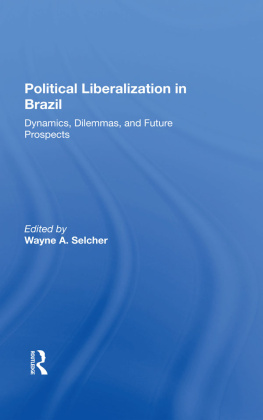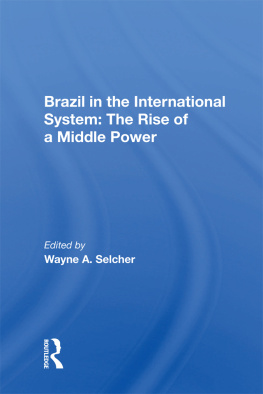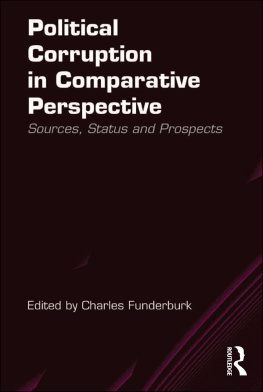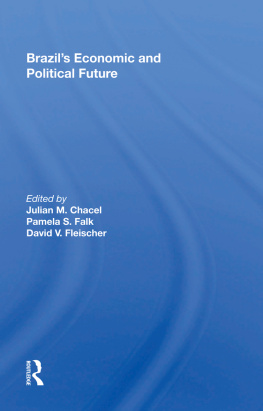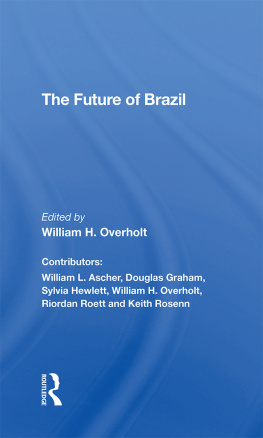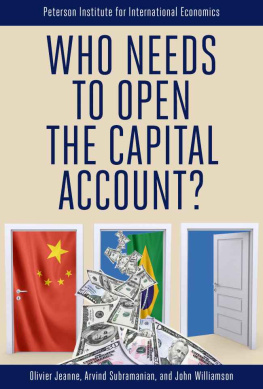Political Liberalization in Brazil
About the Book and Editor
The civilian government inaugurated in Brazil in March 1985, following twenty-one years of military rule, is the culmination of a slow process of liberalization that has brought greater freedom of political expression, organization, and activity. How the Sarney government responds to the challenges it faces and the institutional choices it must make will shape Brazils political evolution for years to come. Should Brazil develop a democratic system, it would be the third most populous democracy in the world. Political trends in Brazil are therefore of considerable significance to Latin America and the United States. In this comprehensive analysis of the forces pushing democratization forward, those opposing it, and the contradictions created by the ad hoc nature of the dynamics between the two, the contributors examine the legacy of two decades of authoritarian rule, the choices facing the civilian government, and possible future developments.
Wayne A. Selcher is College Professor of International Studies at Elizabethtown College in Pennsylvania. He is the editor of Brazil in the International System: The Rise of a Middle Power (Westview, 1981).
First published 1986 by Westview Press
Published 2019 by Routledge
52 Vanderbilt Avenue, New York, NY 10017
2 Park Square, Milton Park, Abingdon, Oxon OX14 4RN
Routledge is an imprint of the Taylor & Francis Group, an informa business
Copyright 1986 by Taylor & Francis, except Chapter 4, 1986 Robert A. Packenham.
All rights reserved. No part of this book may be reprinted or reproduced or utilised in any form or by any electronic, mechanical, or other means, now known or hereafter invented, including photocopying and recording, or in any information storage or retrieval system, without permission in writing from the publishers.
Notice:
Product or corporate names may be trademarks or registered trademarks, and are used only for identification and explanation without intent to infringe
Library of Congress Cataloging-in-Publication Data
Main entry under title:
Political liberalization in Brazil.
(Westview special studies on Latin America and the
Caribbean)
Includes index.
1. Political participationBrazil. 2. Brazil
Politics and govemment1985- . I. Selcher,
Wayne A., 1942-. II. Series.
JL2481.P65 1986 323.0420981 85-11556
ISBN 13: 978-0-367-28346-9 (hbk)
Contents
, Wayne A. Selcher
, Enrique A. Baloyra
, Wayne A. Selcher
, David Fleischer
, Robert A. Packenham
, Donald Share and Scott Mainwaring
, Ronald M. Schneider
The editor would like to thank the Howard Heinz Endowment for research support granted to make possible the compilation of this volume and the completion of . Elizabethtown College also defrayed a portion of the research and preparation expenses.
The original inspiration and encouragement for this book came from colleagues Enrique Baloyra, Bolivar Lamounier, and Amaury de Souza. Suggestions shared among the contributors moved it toward its ultimate form, and their cooperation kept the enterprise progressing. Howard Kroesen and Tom Leap worked out methods of electronic transfer of some of the manuscripts. Alice Knouse, to whom I owe a large debt of gratitude, set it up on the word processor and labored patiently and well through repeated revisions and slippery deadlines. Sharon Patrick furnished timely auxiliary typing assistance. Finally, the staff at Zug Memorial Library provided its usual fine reference support.
Wayne A. Selcher
Wayne A. Selcher
While most U.S. observers of Latin America were focusing attention on the tragedies of violence in Central America, Brazil, a much more significant actor in its own right, underwent a successful and peaceful transition from military rule to representative political institutions. It is rare in the developing world for an authoritarian regime to turn over power gradually and stably to a democratically elected successor, as happened in Brazil. If Brazil, with its 138 million inhabitants, develops a democratic system in both form and public policy, it will be the third most populous democracy in the world, after India and the United States. As part of a democratic trend in Latin America, future political developments in this second most populous nation of the hemisphere are therefore of considerable significance to Latin America, the United States, and the study of transition from military dictatorship toward representative forms of government and the rule of law.
The Rationale for Liberalization, 19741979
Military rule was installed by coup in Brazil in April 1964 as a reaction to internal disorder under the leftist government of President Joo Goulart. For most of the next decade civilian political expression and freedoms were curtailed as the military attempted to purge from society those elements it considered subversive. Excesses of repression and violent opposition were experienced most sharply from 1967 to 1974.
The evolution of Brazilian politics from 1974 to March 1985, in contrast, shows a gradual, begrudgingly and, for the most part, paternalistically granted trend toward greater freedom of political expression, organization, and activity. The process of liberalization proceeded largely within the control of an essentially military regime increasingly desirous of ridding itself of most of its political power, but still afraid of the consequences of genuinely competitive and responsive civilian governance. This approach-avoidance reaction and the constant testing of limits by the opposition entailed some threats and setbacks and a more uncertain and prolonged decompression than, say, in Spain or Portugal. Yet it was relatively stable, contrasted to patterns elsewhere in South America.
During the presidencies of Emlio Garrastaz Mdici (19691974) and the less repressive Ernesto Geisel (19741979), the authoritarian regime was backed by the consensus of the armed forces high command, and it did not tolerate interference from Congress or the judicial branch. Military control was exercised through the naming of a general as president, the enactment of a series of dictatorial institutional acts and national security laws, and the oversight of the National Security Council and National Intelligence Service (SNI), as well as through physical repression. An artificial two-party system was maintained, with strait-jacket effects in the short run. Sociopolitical conflicts were suppressed and postponed rather than resolved, while the emergence of new civilian political leadership was hindered by the bureaucratic-military alliance that monopolized the centralized political process.
This alliance, consolidating power steadily since the coup of 1964, thrived on the enhanced role of the state under Mdici and Geisel. It derived its initial political power from technical competence, shared values, esprit de corps, quasimonopoly of certain development skills, and similar views of the nation-building process.
Liberalization was initiated by Geisel in 1974 as a process of distenso (decompression), a reaction to social (and especially middle- and upper-class) disaffection with government policies, which raised a legitimacy question that had to be dealt with on the political level. The regime leaders had not invested much effort in creating legitimation for a long-term or deeply institutionalized authoritarian model, preferring to justify certain arbitrary actions while still keeping a minimum of democratic rhetoric and referring to the system itself as exceptional. In principle this left open a search for a less harsh and more democratic normality, even as authoritarian practices became routinized.

